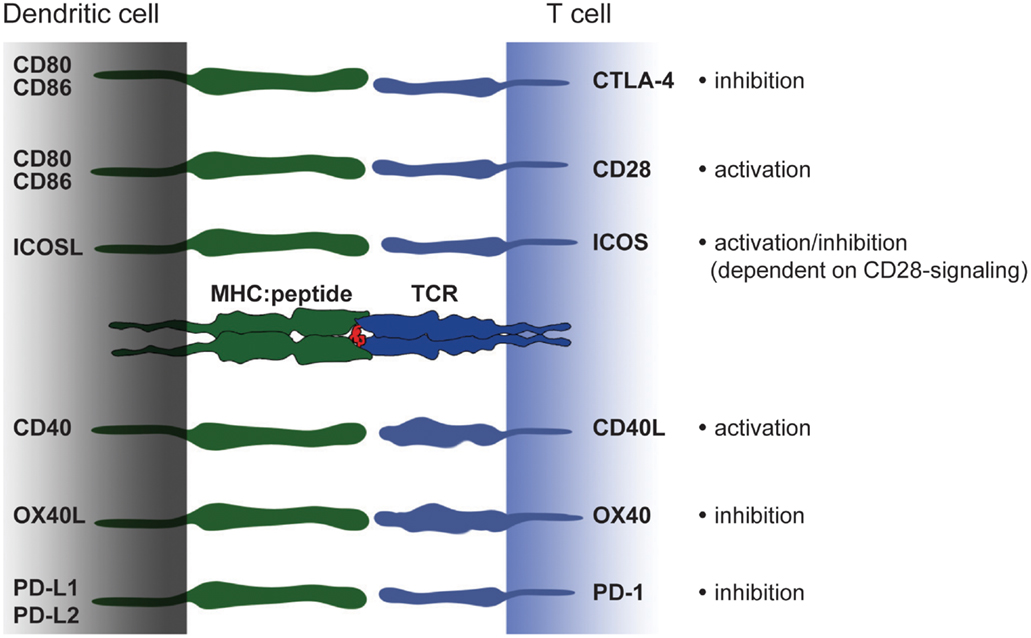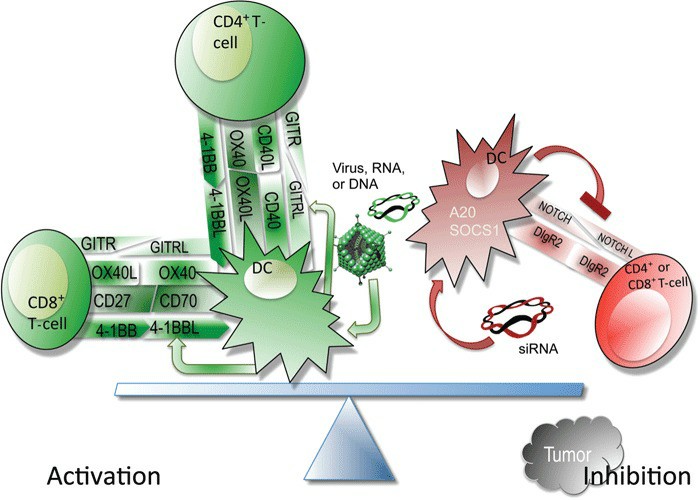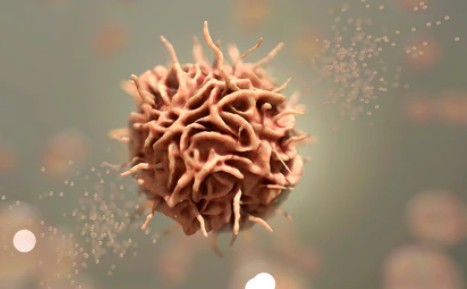Dendritic Cell Co-stimulatory Molecules
Available Resources for Dendritic Cell Co-stimulatory Molecules
Our team at Creative BioMart is committed to providing high-quality products and solutions for dendritic cell co-stimulatory molecules research. We offer a diverse range of recombinant proteins that are essential for studying these molecules and their functions. Our team of experts has extensive knowledge and expertise in this field, ensuring that we can provide personalized solutions to meet the specific requirements of each researcher.
But our commitment doesn't stop at providing products. We also offer a comprehensive collection of resources to support your research. Our resources include detailed information on the involved pathways, protein functions, interacting proteins, research articles, and other relevant information related-dendritic cell co-stimulatory molecules. These resources are designed to assist you in gaining a deeper understanding of dendritic cell co-stimulatory molecules and their role in immune responses.
Whether you are looking for diverse products, tailored solutions, or scientific resources, Creative BioMart is your one-stop shop for all your dendritic cell co-stimulatory molecules-related research needs. We strive to provide the highest level of quality and customer satisfaction, ensuring that you have the tools and support necessary for successful research in this field.
Our Featured Products
- Active Recombinant Human CD80, His-tagged, Biotinylated
- Recombinant Rat Cd80 Protein, Fc-tagged
- Recombinant Mouse CD80 Protein
- Active Recombinant Human CD86 Protein, His & Avi-tagged, Biotinylated
- Recombinant Human CD86, Fc-His tagged
- Active Recombinant Rat Cd86 protein, His-tagged
- Recombinant Mouse Cd86, Fc-His tagged
- Recombinant Human KLRB1 protein, His-tagged
- Recombinant Human ITGA4 & ITGB7 Protein, His-Avi-tagged, Biotinylated
- Recombinant Human CD2, GST-tagged
- Recombinant Mouse Cd2 protein(Met1-Ser203), His-tagged
- Active Recombinant Human CD276 Protein, Fc-tagged, FITC conjugated
- Recombinant Mouse CD276 protein, Fc-tagged
- Active Recombinant Human CD28 protein, hIgG-His-tagged
- Recombinant Human/Cynomolgus/Rhesus macaque CD28 protein, His-tagged
- Recombinant Human CD300A, His tagged
- Active Recombinant Human CD40, Fc Chimera
- Recombinant Rat Cd40 protein, hFc-tagged
- Active Recombinant Human CD74 protein, His-tagged
- Recombinant Human CLEC7A, His-tagged
- Recombinant Mouse Clec7a protein(Phe69-Leu244), His-tagged
- Recombinant Human CTLA4, Fc-His tagged
- Recombinant Bovine CTLA4 Protein
- Active Recombinant Human TIGIT protein, Fc-tagged
- Recombinant Mouse Tigit, His tagged
- Recombinant Human TNFRSF9, Fc-His tagged
- Active Recombinant Rhesus TNFRSF9 Protein, Fc-tagged
- Recombinant Human TNFSF9, GST-tagged
- Recombinant Cynomolgus TNFSF9 protein, Fc-tagged, Biotinylated
- Recombinant Human TNFSF9, GST-tagged
- Recombinant Rat Tnfsf9 Protein, Fc-tagged, FITC conjugated
- Recombinant Human VTCN1, GST-tagged
- Recombinant Rat Vtcn1 Protein, His-tagged
- Active Recombinant Rhesus macaque VTCN1 Protein, His-tagged
If you have any questions, requirements, or cooperation intentions, please feel free to contact us. We very much look forward to working with you and helping you achieve research and commercial success.
 Fig.1 Costimulatory molecules and their ligands–a brief overview. (Hubo M, et al., 2013)
Fig.1 Costimulatory molecules and their ligands–a brief overview. (Hubo M, et al., 2013)
Modulation of T cell activation is mediated by an interplay of different costimulatory molecules expressed on DC that have either immunogenic or tolerogenic function. The picture shows an overview of members from the B7 and TNF-receptor family expressed on DC and their binding partners on T cells. In the last decade a number of new costimulatory molecules have been identified. However, in the context of monocyte-derived DC CD80 and CD86 constitute powerful members of the costimulatory family. Strong CD80/CD86-derived signals can overcome e.g., ICOSL-mediated signaling and thereby turning a rather tolerogenic signal into an immunogenic.
About Dendritic Cell Co-stimulatory Molecules
Dendritic cells (DCs) are a specialized type of immune cell that plays a crucial role in initiating and orchestrating immune responses. They are known for their ability to capture, process, and present antigens to other immune cells, thereby activating and directing the immune system against potential threats such as pathogens or cancerous cells.
To effectively activate other immune cells, dendritic cells need to provide co-stimulatory signals in addition to antigen presentation. Co-stimulatory molecules are surface proteins on the dendritic cells that interact with receptors on other immune cells, delivering signals that instruct them to become activated and mount an immune response.
- CD80 (B7-1) and CD86 (B7-2) belong to the B7 family and are the major co-stimulatory molecules expressed by dendritic cells. They interact with CD28 receptors on T cells, providing the "second signal" necessary for optimal T cell activation. Engagement of CD80/CD86 with CD28 promotes T cell proliferation, cytokine production, and differentiation into effector cells. Additionally, // b9 can also bind to CTLA-4, a regulatory molecule on T cells, which delivers inhibitory signals.
- Inducible Co-stimulatory Molecule (ICOS): ICOS is another co-stimulatory molecule expressed on dendritic cells. It interacts with its ligand ICOSL (B7-H2) on T cells, amplifying T cell activation and promoting T cell survival. ICOS signaling enhances cytokine production, T cell differentiation, and the generation of memory T cells. ICOS is particularly important in the context of T follicular helper (Tfh) cell differentiation and the development of humoral immune responses.
- OX40 (CD134): OX40 is a co-stimulatory molecule expressed on dendritic cells and activated T cells. It binds to its ligand OX40L (CD252) on antigen-presenting cells, including dendritic cells. OX40 signaling enhances T cell survival, proliferation, and cytokine production. It is involved in the generation of effector T cells and the development of memory T cells.
- 4-1BB (CD137): 4-1BB is a co-stimulatory molecule expressed on dendritic cells and T cells. It interacts with its ligand 4-1BBL (CD137L) on antigen-presenting cells. Engagement of 4-1BB promotes T cell activation, survival, and expansion. It is involved in the generation of effector T cells and the development of memory T cells.
- Programmed Death-Ligand 1 (PD-L1): PD-L1 is expressed on dendritic cells and other immune cells. It interacts with programmed cell death protein 1 (PD-1) on T cells, delivering inhibitory signals. PD-L1/PD-1 interaction is a critical mechanism for immune regulation and tolerance, preventing excessive immune activation and tissue damage.
Other Co-stimulatory Molecules: Dendritic cells can express other co-stimulatory molecules, such as CD40, CD70, and 4-1BBL (CD137L). These molecules provide additional signals for T-cell activation, survival, and differentiation.
 Fig.2 Pathways of activation and inhibition via costimulatory molecules. (Boudreau J E, et al., 2011)
Fig.2 Pathways of activation and inhibition via costimulatory molecules. (Boudreau J E, et al., 2011)
Dendritic cell (DC)-mediated T-cell activation requires a second, antigen nonspecific signal. Costimulatory molecules are not constitutively expressed by DCs; they are upregulated during maturation and as a consequence of environmental conditions. Similarly, DCs can inhibit T-cell activation or suppress T-cell activity, especially in the context of pre-existing tumors. Gene modification of DCs has been utilized both to enhance expression of activating costimulatory molecules and to inhibit expression of inhibitory molecules shown in this figure.
The expression of co-stimulatory molecules on dendritic cells is tightly regulated and can be influenced by various factors, including pathogen-derived signals, cytokines, and inflammatory mediators. The engagement of co-stimulatory molecules by T cells is essential for the formation of the immunological synapse, effective T cell activation, and the generation of appropriate immune responses against pathogens. Additionally, the balance between co-stimulatory and inhibitory signals is crucial for immune regulation, preventing immune hyperactivation, and maintaining immune tolerance.
Applications of Dendritic Cell Co-stimulatory Molecule
Vaccine Development: Dendritic cells expressing co-stimulatory molecules can be used to develop vaccines. By incorporating specific antigens into dendritic cells and providing co-stimulatory signals, they can efficiently activate antigen-specific T cells and elicit robust immune responses. This approach has been explored for the development of cancer vaccines, infectious disease vaccines, and therapeutic vaccines targeting autoimmune diseases.
- Cancer Immunotherapy: Co-stimulatory molecules expressed on dendritic cells can be targeted to enhance anti-tumor immune responses. For example, antibodies or fusion proteins targeting co-stimulatory molecules such as CD40, OX40, or 4-1BB can be used to activate dendritic cells and promote tumor-specific T-cell activation. This approach aims to overcome immune tolerance to cancer and stimulate potent anti-tumor immune responses.
- Immune Modulation: Dendritic cell co-stimulatory molecules can be targeted to modulate immune responses in various diseases. For instance, blocking the interaction between PD-L1 on dendritic cells and PD-1 on T cells using antibodies or fusion proteins can enhance T cell activation and overcome immune suppression in cancer or chronic viral infections. Conversely, enhancing co-stimulatory signals through agonistic antibodies or fusion proteins can promote immune activation and combat immune deficiencies.
- Allergy and Autoimmune Diseases: Co-stimulatory molecules on dendritic cells can be targeted to regulate immune responses in allergic and autoimmune diseases. Strategies such as blocking CD80/CD86 interactions with T cells or promoting inhibitory signals through PD-L1/PD-1 can help modulate immune activation and reduce inflammation in conditions like asthma, rheumatoid arthritis, or multiple sclerosis.
- Immune Tolerance Induction: Dendritic cells expressing specific co-stimulatory molecules can be utilized to induce immune tolerance in situations where the immune system needs to be suppressed. By delivering tolerogenic signals, dendritic cells can promote the development of regulatory T cells and dampen excessive immune responses. This approach has potential applications in transplantation, autoimmune diseases, and allergic disorders.
- T Cell Expansion and Adoptive Cell Therapy: Co-stimulatory molecules expressed on dendritic cells can be utilized to expand and activate T cells ex vivo for adoptive cell therapy. Dendritic cells can be engineered to express specific co-stimulatory molecules or loaded with antigenic peptides to stimulate T cell proliferation and enhance the efficacy of adoptive cell therapy approaches.

These applications highlight the importance of dendritic cell co-stimulatory molecules in modulating immune responses and their potential in immunotherapy and immune regulation strategies. Continued research in this field may lead to new therapeutic approaches for various diseases by targeting dendritic cell co-stimulatory pathways.
References:
- Hubo M, Trinschek B, Kryczanowsky F, et al. Costimulatory molecules on immunogenic versus tolerogenic human dendritic cells[J]. Frontiers in immunology, 2013, 4: 82.
- Magee CN, Boenisch O, Najafian N. The role of costimulatory molecules in directing the functional differentiation of alloreactive T helper cells. Am J Transplant. 2012;12(10):2588-2600. doi:10.1111/j.1600-6143.2012.04180.x
- Bakdash G, Sittig S P, Dijk T, et al. The nature of activatory and tolerogenic dendritic cell-derived signal II[J]. Frontiers in immunology, 2013, 4: 53.
- Boudreau J E, Bonehill A, Thielemans K, et al. Engineering dendritic cells to enhance cancer immunotherapy[J]. Molecular therapy, 2011, 19(5): 841-853.


